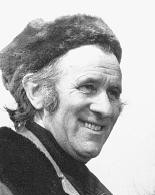
I'm not a cameraman. I'm the director's collaborator.
(...) there are three kinds of photography in movies. There's good photography, bad photography, and there's the right photography.
Kameramann (BSC), Regisseur * seit 1934 beim Film - absolviert zuerst Lehre bei einem Standfotografen * ab 1936 arbeitet bei Gaumont-British (als clapper loader), später in British and Dominion Studios sowie in Pinewood Studios (als camera assistant) * 1939-46 Kriegsdienst beim Kinematographic Unit der British Army * 1947-55 als camera operator für u.a. Christopher Challis (The Small Back Room, 1948; The Tales of Hoffmann, 1950) und Oswald Morris (Moulin Rouge, 1952; Beat the Devil, 1953; Beau Brummell, 1954) tätig * 1956 steigt zum Chefkameramann auf (A Hill in Korea) und etabliert sich sofort als führender cinematographer (Room at the Top, 1958; Sons and Lovers, 1960; The Innocents, 1961) * 1961 wechselt ins Regiefach (Two and Two Make Six) und inszeniert bis Ende der 70er Jahre rund zwei Dutzend (Grusel)filme für v.a. Hammer und Amicus ("Those were the only films I was being offered as a director." Sight and Sound, 1992 | "I suppose I can say I slightly regret all the horror things I directed, but I didn't regret them at the time, because I enjoyed making them /.../ To be quite honest, the standard of films I've photographed, both in terms of quality and money spent, are very different from the films I've directed. If I could direct some films with the same budgets as those I've photographed, I'd prefer directing." Film Journal, 1996) * triumphales Comeback als Kameramann mit David Lynchs Drama The Elephant Man (1979/80) - auch bei seinem letzten Film (The Straight Story, 1998) arbeitet mit David Lynch zusammen * 1982-93 filmt drei Fernsehproduktionen (The Plot to Kill Hitler, 1990; A Life in the Theater, 1993) * seit 1983 arbeitet (fast) ausschließlich für amerikanische Produzenten (Glory, 1989; Cape Fear, 1990/91) * 1998-2000 Präsident der British Society of Cinematographers [BSC] * (Co-)Autor zweier Bücher: Light'em Up: A Gaffer Remembers a Lifetime Making Movies (1996) und Inside Hammer (2001)
# A Hill in Korea (An vorderster Front, 1956-GB
* Julian Amyes) 81m-Kriegsdrama
# Time without Pity (In letzter Stunde, 1956-GB * Joseph Losey) 88m-Krimidrama
(5703)
# The Scamp (1957-GB * Wolf Rilla) 87m-Drama
# Next to No Time! (1958-GB * Henry Cornelius) 93m-Komödie
# Virgin Island (1958-GB * Pat Jackson) 94m-Drama
# Room at the Top (Der Weg nach oben, 1958-GB * Jack Clayton) 117m-Drama
# The Battle of the Sexes (Mr. Miller ist kein Killer, 1959-GB * Charles
Crichton) 84m-Komödie
# Never Take Sweets from a Stranger (Vertraue keinem Fremden, 1959/60-GB/USA
* Cyril Frankel) 81m-Krimidrama (6003)
# Sons and Lovers (Söhne und Liebhaber, 1960-GB * Jack Cardiff) 103m-Drama
# Saturday Night and Sunday Morning
(Samstagnacht bis Sonntagmorgen, 1960-GB; R: Karel Reisz, B: Alan Sillitoe,
K: FF, M: John Dankworth, D: Albert Finney, Shirley Anne Field) 89m-Sozialdrama
(Roman von Alan Sillitoe)
# The Horsemasters (1961-USA * William Fairchild) 87m > ursprünglich
2teiliger TVM
# The Innocents (Schloß des Schreckens, 1961-GB * Jack Clayton) 99m-Thriller
# Night Must Fall (Der Griff aus dem Dunkel, 1963-GB * Karel Reisz) 105m-Drama
# The Elephant Man (Der Elefantenmensch,
1979/80-USA; R: David Lynch, B: Christopher
De Vore, Eric Bergren, David Lynch, K: FF, M: John Morris, D: Anthony
Hopkins, John Hurt, Anne Bancroft) 124m-Drama (10-05)
# The French Lieutenant's Woman (Die Geliebte des französischen Leutnants,
1980/81-GB * Karel Reisz) 123m-Melodram
# The Executioner's Song (1982-USA * Lawrence Schiller) > 2teiliger
TVM (200m) + Kinoversion (97m; GB)
# The Jigsaw Man (Agenten sterben zweimal, 1982-GB * Terence Young) 98m-Agententhriller
# Memed My Hawk (Memed, mein Falke, 1982/83-GB/YU * Peter Ustinov) 110m-Abenteuerdrama
(8405)
# Dune (Der Wüstenplanet, 1983-USA; R+B:
David Lynch, K: FF, M: Toto, D: Francesca Annis, Leonardo Cimino, Brad
Dourif, Jose Ferrer, Linda Hunt, Freddie Jones, Richard Jordan, Kyle MacLachlan,
Virginia Madsen, Silvana Mangano, Everett McGill, Kenneth McMillan, Jack
Nance, Sian Phillips, Jürgen Prochnow, Paul L. Smith, Patrick Stewart,
Sting, Dean Stockwell, Max von Sydow, Alicia Witt, Sean Young) 140m-Science-Fiction
(Roman von Frank Herbert) (03-09; 05-10:
bfi)
# Code Name: Emerald (Codename: Emerald, 1984/85-USA * Jonathan Sanger) (Roman von Ronald Bass) (8509)
# Brenda Starr (Brenda Starr, 1986-USA * Robert Ellis
Miller) 92m-Abenteuer (07-?; 8908-D)
# Clara's Heart (Claras Geheimnis, 1987/88-USA * Robert
Mulligan) 108m-Melodram (10-?; 8810)
# Her Alibi (Ninas Alibi, 1988-USA * Bruce Beresford) 94m-Krimikomödie
(8902)
# Glory (Glory, 1989-USA * Edward Zwick) 122m-Bürgerkriegsdrama
(02-04; 8912)
# The Man in the Moon (Der Mann im Mond, 1990-USA * Robert
Mulligan) 99m-Familiendrama (06-08; 9110)
# Cape Fear (Kap der Angst, 1990/91-USA;
R: Martin Scorsese, B: Wesley Strick, K: FF, MB: Elmer Bernstein, D: Robert
De Niro, Nick Nolte, Jessica Lange) 128m-Psychothriller (Roman
von John D. MacDonald)
# School Ties (Der Außenseiter, 1991-USA * Robert Mandel)
107m-Jugenddrama (09-11; 9209)
# Princess Caraboo (Prinzessin Caraboo, 1993-USA * Michael
Austin) 96m-Komödie (09-11; 9409)
# Rainbow (Rainbow - Die phantastische Reise auf dem Regenbogen, 1994/95-GB/CDN
* Bob Hoskins) 98m-Fantasyabenteuer (11-?)
# The Straight Story (1998-USA/F/GB * David Lynch) (09-10; 9910)
> Academy Award/Oscar (beste Kamera /in Schwarz-Weiß/) für Sons and Lovers (1961)
> BSC Award für The Elephant Man (1980)
> BSC Award für The French Lieutenant's Woman (1981)
> Special Achievement Award (Kamera) für The Elephant Man [London Critics Circle Film Awards 1982]
> Academy Award/Oscar (beste Kamera) für Glory (1990)
> BSC Award für Glory (1990)
> Special Achievement Award [London Critics Circle Film Awards 1993]
> Lifetime Achievement Award [British Society of Cinematographers, 1997]
> International Award [American Society of Cinematographers, 1998]
> New York Film Critics Circle Award (beste Kamera) für The Straight Story (1999)
> Lifetime Achievement Award [Camerimage, 2002]
> Wheeler Winston Dixon: The Films of Freddie Francis. Metuchen/London: Scarecrow Press, 1991